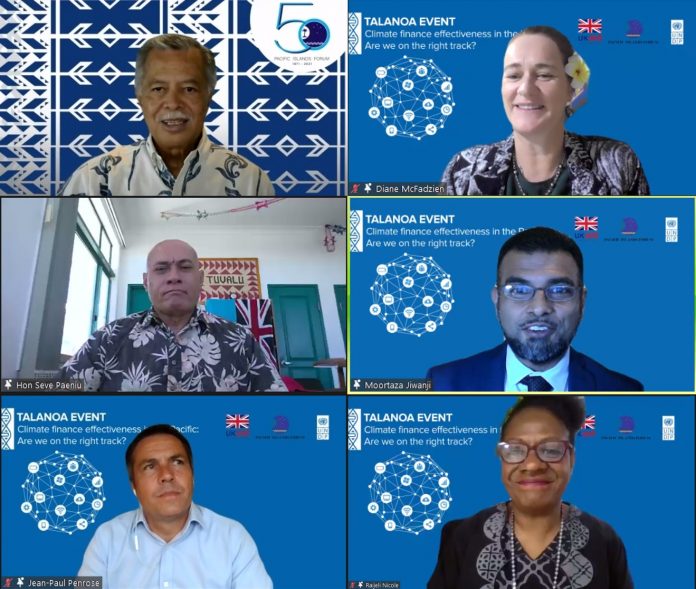TALANOA EVENT
The Pacific Islands Forum (PIF) in partnership with the United Nations Development Programme (UNDP) and the UK Government hosted a Talanoa event, titled Climate Finance Effectiveness in the Pacific: Are we on the right track? on Thursday 9 September 2021.
This regional dialogue explored whether the US$2.2 billion international climate finance received in the Pacific over the past decade has been effective in tackling the impacts of climate change and what measures could help to make it more impactful in the future. The Talanoa was timed to ensure that Pacific voices feed into discussions on climate finance at the UN Climate Change Conference – COP26 – which takes place in Glasgow, UK later this year.
Moderated by UNDP, the Talanoa brought together representatives from PIF, the government of Tuvalu, Oxfam Pacific, the Green Climate Fund, and the UK Government who shared their perspectives on climate finance effectiveness in the region. More than 200 participants from around the region joined the meeting.
Opening the dialogue, the Pacific Islands Forum Secretary-General, Henry Puna highlighted that “Pacific Island Countries need adaptation action now and with that comes the need for substantial financial flows. Equally important, the increased financial flows must also be matched with increased access for Pacific Island Countries who bear the brunt of these impacts more so than most other countries in the world. The recent Intergovernmental Panel on Climate Change (IPCC) report removes any doubt that this is so”.
He added that “while improved access remains a priority, the other key element is the effectiveness of climate finance in the Pacific. Climate finance effectiveness should result in improved resilience for our Pacific communities and people. These are critical issues that the Forum Economic Ministers Meeting has been discussing over the past decade and most recently elevated the importance of ensuring the effectiveness and accountability for climate finance that flows into our region”.
The dynamic panel of speakers surfaced a number of challenges facing the region with regards to access to climate finance and using it most effectively.
Seve Paeniu, Tuvalu Minister for Finance and Chair of the Pacific Forum Economic Ministerial Meeting, highlighted that “despite a significant amount of climate finance raised, climate change is still having profound effects on Small Pacific Islands States”. He noted that to provide coastal protection against sea level in Tuvalu will cost over US$300m and that whilst grateful for the GCF US$36m funding for sea defences there is still a massive shortfall. He added that “climate finance needs to focus more on delivering resilience for the most vulnerable communities”.
On the way climate finance is currently delivered, Jean-Paul Penrose, Pacific Development Director, UK Foreign, Commonwealth and Development Office, British High Commission Suva, noted that “short term, projectised funding does not always lend itself to delivering sustainable, inclusive and resilient development outcomes”. Furthermore, Raijeli Nicole, Regional Director, Oxfam in the Pacific emphasised that “climate finance cannot be about loans. Loans transfer the risk on to the beneficiaries. We cannot give our children the burden of serving our loans”.
The Pacific Islands Forum Secretary-General Puna identified that “more can be done” and urged countries and development partners to integrate more comprehensive climate ambitions into their mandates and performance systems so that “climate priorities be genuinely mainstreamed into development”. Panelists were asked to identify areas for reform.
Jean-Paul Penrose emphasised from a donor perspective that “there is a need to bring together the principles of aid effectiveness and climate finance initiatives to deliver stronger development outcomes which meet the needs of the poor and most vulnerable and are fully aligned with the climate and development priorities of Pacific nations”. This was echoed by Vineil Narayan, Director Climate Change, Ministry of Economy Fiji who offered an intervention that “the narrative is not just climate change, but development first”.
Linked to these sentiments, Diane McFadzien, Regional Manager Asia Pacific, Green Climate Fund shared that “we want to see countries in the driver’s seat, countries driving to their own destinies”. Seve Paeniu emphasised that “climate finance needs to be channeled in a way that builds national capacity, national ownership”.
Raijeli Nicole spoke to the key challenge of ensuring financing reaches communities and vulnerable groups in the pacific. “Participation isn’t about coming in to help design. It is about citizenship. We design with people for people”.
Moving forward, there was a strong desire for ongoing dialogue and partnership, as emphasised by McFadzien “there is a need for a lot more collaboration, and not ignoring lessons that have been learned”. Moderator, Moortaza Jiwanji, UNDP Pacific Office in Fiji, noted an emerging call for action for more effective climate financing, requiring a stronger focus on development and the underlying drivers of vulnerability, systems change at all levels of development, and more agile approaches to climate financing to achieve more climate-resilient development.
As the region looks towards COP26 later this year, this dialogue provided an important opportunity for shifting the narrative and creating space for more regular and ongoing Talanoa on climate finance effectiveness in the region. A report on Climate Finance Effectiveness in the Pacific commissioned by the UK Government will be issued later this month in order to inform and influence decisions on climate finance at COP26.
For more information, or media interviews please contact:
Lisa Williams-Lahari, Public Affairs Adviser, Pacific Islands Forum, Email: lisaw@forumsec.org
Summer Lee, Partnership, Donor Liaison and Communications Specialist, Gov4Res Project, UNDP Pacific Office in Fiji, Email: summer.lee@undp.org
Kashimita Rao, Communications Officer, British High Commission, Suva Email: kashmita.rao@fcdo.gov.uk
SOURCE: UNDP/PIFS/UK GOVT/PACNEWS


















